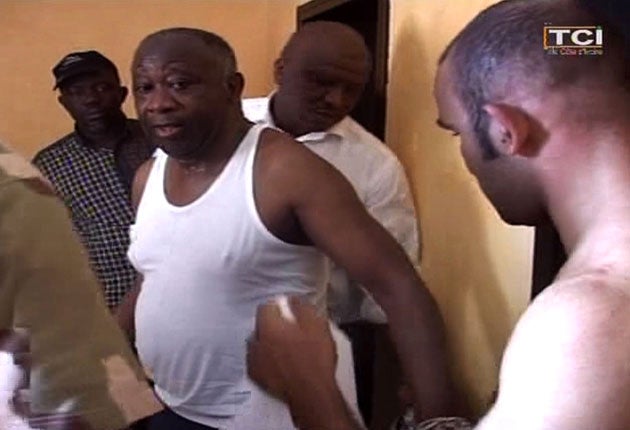Gbagbo: Stripped of dignity, stripped of power
Dictator's capture gives hope to Ivory Coast

A bewildered old man in a hotel room, stripped to his vest and surrounded by strangers. These were the first pictures that emerged of Laurent Gbagbo after he was forced blinking into the light yesterday by a thunderous French assault on his Abidjan bunker that ended with him being handed over to his nemesis, Alassane Ouattara.
News of his capture crackled across this lagoon city, which has been transformed into a looted wasteland by the 65-year-old's refusal to cede power.
As people who have been living with the boom of heavy weapons dared to hope that the worst was over, a shout rang out: "Gbagbo fini!"
He wasn't dead but he was out of power. After four months of failed negotiations, atrocities and a return to civil war, the result of an African election was made to stand. But this was achieved through a massive show of French force that may have left lethal complications in its wake in this deeply divided West African nation.
The day began with an armoured convoy of 30 vehicles rumbling out from the base of France's Unicorn Force and heading into the city. Overnight, French and UN helicopters had repeatedly struck at the positions of forces loyal to Mr Gbagbo and partially destroyed the residence on top of his bunker. But he hadn't surrendered.
One Western diplomat complained in the morning that "they should finish this and go in there and get him".
Witnesses in Cocody saw French tanks join the Ouattara forces who had encircled Mr Gbagbo's residence and the sounds of a ferocious fight echoed around the lagoon. The former history professor and his family had retreated to a chamber under the basement of his residence, where they were protected by his Republican Guard and mercenaries reported to be Angolan. Then came the news of his capture.
At midday Mr Gbagbo made the humiliating journey of just 3km across the Abidjan lagoon to the Golf Hotel, where he had previously encircled and besieged Mr Ouattara. The reversal of fortunes was total. Simone Gbagbo, the wife whose ambition is blamed by many in Ivory Coast for turning a socialist academic into a stereotypical African big man, was shown in her nightdress looking forlorn.
A diplomatic offensive was under way to distance France from the arrest of the man who has accused the former colonial power of leading an international plot to oust him. "There wasn't one single French soldier at the residence of Laurent Gbagbo," Frederic Daguillon, the spokesman for the French forces in Abidjan, said. But minutes earlier an aide to Mr Ouattara told The Independent that Mr Gbagbo had been "handed over by the French to the legitimate government".
Mr Ouattara, a former economist with the International Monetary Fund who waited four months after being declared the winner in the closely watched November election, had been careful to deny accusations that he was an international stooge. He had been content previously to pursue a strategy of economic strangulation after the Gbagbo camp had overturned the election result and declared their man the winner. When sanctions failed and rebel forces, who have controlled the north of Ivory Coast since the country was split in two by the last civil war, swept up to the gates of Abidjan 10 days ago, Mr Ouattara made them pause.
A failed "final push" by his forces last week saw him make a speech on Thursday in which he vowed to encircle and then starve out his rival rather than batter his way into the compound and risk making a martyr of Mr Gbagbo. That approach underestimated the belligerence of the man who has ruled the country for the past 11 years.
Gbagbo forces barraged first the French ambassador's residence on Friday and then the UN-protected Golf Hotel over the weekend. The UN secretary general, Ban Ki-moon, called for Mr Gbagbo's guns to be silenced.
Security Council resolution 1973 gave the combined international force the right to attack the Ivorian strongman's heavy weapons if they were being trained on civilians or the UN.
With hundreds of thousands of Ivorians trapped in their homes by the fighting, whole areas without water or electricity and the hospital morgues full to overflowing, the French tanks rolled into the wealthy Cocody neighbourhood, past the ruined ambassadors' residences that lie only a few hundred metres from Mr Gbagbo's home and ended the battle.
In an address to the nation last night, Mr Ouattara said Ivory Coast was "finally at the dawn of a new era of hope". "Every measure has been taken to assure the physical integrity of Laurent Gbagbo, his wife and all those arrested," he added. "They will receive dignified treatment and their rights will be respected."
On the Charles de Gaulle bridge, which has seen some of the worst of the fighting, a young man in a filthy vest was pushing a cart loaded with firewood. When he saw the French convoy with its helmeted machine gunners coming the other way, he stopped his cart and stepped into the road to give them an angry thumbs down.
A few hundred feet away was a roadblock manned by men without uniforms who were waving guns and threatening people. Abidjan faces a long road to recovery.
Join our commenting forum
Join thought-provoking conversations, follow other Independent readers and see their replies
Comments